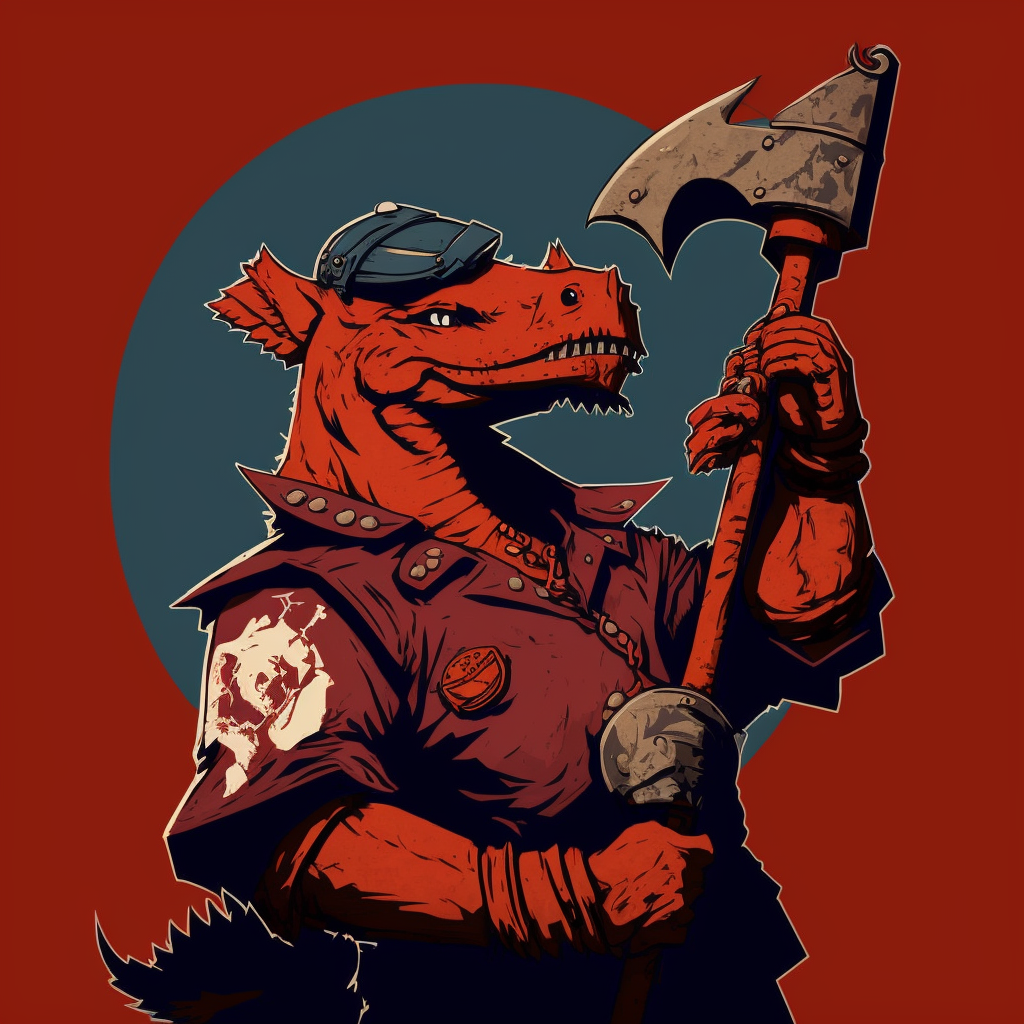I don't know man. That's like two comments and they could be from anywhere on the page.
I'm not saying TVTropes is great but it does foster a culture of everyone and their fucking grandma contributing the dumbest possible takes on some of the pages. You're bound to find two morons.
If it was a fascist shithole entirely, they wouldn't have a page for the Bechdel Test
Yeah, this is kind of like if someone took a screenshot of a wrecker here and was like “hexbear is transphobic shithole”.
"I can't believe people are on this site defending Kyle Rittenhouse" points to comment by now-banned wrecker that everyone is shitting on
Oh no! A soldier might have taken a watch; I guess the Soviets were the real bad guys of WW2.
Isnt it like a thing in most war movies that good patriotic americans take watches off dead germans?
I would say that after fighting your way from the Moscow suburbs and then all the way across Ukraine, Belarus, Poland, and half of Germany you're entitled to a couple watches.....or, maybe the Red Army is canceled.
dang I wonder what these nazi guys did when they were the occupying force
They were very polite, honorable, and conflicted. My brain has been formed solely by post 9/11 american media and I know that the world is a gray, gray place so you cant really say the Nazis were bad.
nono they were just maniacally cackling the whole time while they were stuffing babies into gulags and burning their own crops to institute their evil plans , which was just making bigger, more efficient baby-gulags.
Nooooo you can't just steal the artifacts and gold we stole from the people we've been genociding :angery:
CW:
"Civilized" nations would never do anything bad to people they invade! https://en.wikipedia.org/wiki/Eddie_Gallagher_(Navy_SEAL)
TV Tropes used to have a snarky tone in general, which was rather fun. But they also had the rule of not wanting to cause fights. So first, it was hot button political issues, which is understandable, as it's not that relevant to the wiki, then made it so that you can't be snarky about some trash anime because fans might get offended. Then, it eventually went to the point that you couldn't flame anyone who actually deserves it, like actual nazis. And you know what they say about nazis and non-nazis at the table...
Ah we're doing the thing again where one post or comment is deemed to be representative of the entire site
I spend half my internet time on tvtropes, but this is not really cherrypicking
It's absolutely a bad site, but mostly not for nazi reasons
TVtropes is all about reciting shows the editors have seen. They're no-life losers. The only human connection they get is garbaging up that site all day. Good thing I read the whole site about 5 years ago and no longer need it. The last time I checked the "Examples" section just got longer and longer because there's only adding, never subtracting. The "Anime" section is especially long, revealing who really spends the most time on the site.
Oh, they did subtract. That time they made that controversial decision to remove all lolicon and pedo shit. People actually tried to compare Nabokov's Lolita to Kodomo no Jikan (do NOT Google, it's borderline child porn).
TVTropes also nuked all of the articles about porn series. Goes to show that advertiser revenue is the real censor of internet content - if Google Adsense didn't care what was on your web page I guarantee all of that stuff would still be up.
I just ran into this shit yesterday when scrolling through tv tropes. They will defend or add "nuance" to literal nazism anyway anywhere. But anything positive about a communist must be destroyed and scorned. If they mention soviets doing a good thing, they will randomly bring up Holodomor etc. its fun, but one of the most virulently "history nerd" type sites out there
Two stolen watches on your wrist: Absolutely unacceptable
Fifteen watches made of stolen materials purchased with stolen money in your bedroom: Perfectly good and normal
history flows backwards and forwards. The revolutionary war of america was good because it fostered freedom and totally wasn't a bunch of whiny babies who didn't know what it meant to be colonizers.
Fascist Tropes:
- A God am I
- Always Chaotic Evil
- Amoral Afrikaner
- Aristocrats are Evil
- Arrogant Kung-Fu Guy
- Ax-Crazy
- The Bad Guy Wins
- Big Bad
- Blood Knight
- Breakout Villain
- The Bully
- Complete Monster
- Devil Complex
- Draco in Leather Pants
- Easily Forgiven
- Evil is Hammy
- God-Mode Sue
- Karma Houdini
- Moral event horizon
- Smug Super
- Villain Sue
- VIllains With good publicity
and that's the one's I can just name off the top of my head. As you can see, I love TVTropes, so seeing this kinda hurt.
Disgusting.
Also, for some reason wasn't that thing (whatever it is) also like a good repository for anarchist literature or somehting like that? I'm probably remembering wrong.
TVTropes is like Reddit in that it has the right wing skew you'd expect from libertarian tech bros, but doesn't actively remove anything unless it becomes a problem for their advertisers. So there's a lot of useful information about anarchism and communism on there, it's just outnumbered by the amount of casual reaction that's also there.
anything large enough and text based is a good place to hide resources, because you can just redeposit them once they get found by an enemy. Too visual like youtube and you'll get noticed more quickly, too small and it will be easier to filter. This massive jumble has so much going on you can hide anything and not get caught for some time.
You mean this?https://tvtropes.org/pmwiki/pmwiki.php/UsefulNotes/Anarchism
spoiler
Anarchy is, and always has been, a romance. It is also clearly the only morally sensible way to run the world." — Alan Moore Of all the political philosophies that have existed throughout history, anarchism is perhaps the most misunderstood. With general impressions ranging from the idea that Anarchy Is Chaos to scary images of Bomb-Throwing Anarchists from popular fiction, what most probably don't realise is there's actually a wealth of complex and multilayered ideas associated with anarchism that have had an impact on radical politics, the arts, and even mainstream culture.
The definition of anarchism to most people means "belief the state is bad and shouldn't exist." However, while all anarchists are anti-statists, it is not the only or, in most cases, even the primary part of their ideology.
Anarchism is the belief that rulership as a whole, not just the state, should not exist – as indicated in its Greek roots, an- [no] -arkhos [ruler] – and that people should instead organize their social relations and institutions though voluntary cooperation without hierarchies of power. So what characterises anarchism is not anti-statism so much as anti-authoritarianism. note
This means that most anarchists would not welcome a reduction in state power if it meant an increase of other kinds of authoritarianism as a result. For example, privatising a public health service may weaken the state, but increase the power of corporations, and thus anarchists would probably oppose doing so. Though generally speaking, they don't support state or private management of things. Instead, anarchists push for voluntary, localised, and cooperative institutions organised from the bottom-up through decentralised networks and run via processes of participatory democracy and workplace self-management.
Another way of thinking about anarchism is that it's "democracy without the state" or "socialism when it occurs on a voluntary basis". This tends to confuse many who
associate the word democracy with representative government; and especially those who associate the word socialism with statism. In fact, the word democracy originally meant direct democracy, like in Ancient Greece. And the word socialism originally referred to a number of economic systems in which economic institutions were run by those who actually worked in them. It's the earlier meanings of both words that anarchists use when talking about them. This also applies to their use of the word libertarian. Which, despite its modern Anglo-American use to mean laissez-faire capitalist, was actually first used by anarchist socialists to mean "anti-authoritarian". A frequently used synonym for social anarchism is libertarian socialism.
In addition to the systems of centralised power found in statism and capitalism, anarchists also support dissolving all forms of social hierarchy and domination (i.e., rulership) - such as sexism, racism, queerphobia, ableism, speciesism, and the domination of nature - and restructuring society on a decentralised and horizontalist basis.
There are two main categories of political anarchist thought, divided chiefly by what kind of economic system they want to build.
Market Anarchists want a stateless free market economy made up of producer and consumer cooperatives and self-employed professionals instead of private corporations and wage-labour. While once very popular, especially in America, market anarchism has ended up becoming a minority in the larger anarchist canon. Social Anarchists, on the other hand, want what could be called a "free commons", note in which systems of decentralised and localised planning of the economy (by directly-democratic popular assemblies and worker-controlled enterprises) replace traditional market relations. In terms of numbers, this is by far the most prominent anarchist tradition and is what most people are referring to when they talk about "anarchism" without prefixes. Both of these in turn are sub-divided into four overall proposals for different economic systems, each associated primarily with a different anarchist "founding father", with the first two being forms of market anarchism and the later two social anarchism:
Mutualist anarchism (Pierre-Joseph Proudhon) Individualist anarchism (Benjamin Tucker) Collectivist anarchism (Mikhail Bakunin) Communist anarchism (Peter Kropotkin) Despite their differences, they all share a social commitment to the ideal of organising things on the basis of "voluntary, non-hierarchical cooperation".
Anarchism was extremely popular in labour movements around the world in the late 19th and early 20th century, so much so that for a time it surpassed Marxism as the principal philosophy of working class struggles. Historian Benidict Anderson makes the case that anarchism was in fact the first "anti-systemic" movement that was fully global in scale, having influence in areas Marxism didn't reach for decades, like Japan, the Philippines, Latin America, Egypt, and Southern Africa.
Its popularity waned somewhat after the Russian Revolution in which Marxists took power for the first time. Then after a last hurrah in the late 1930s, in which there was an anarchist revolution in Spain and Catalonia, it flickered out in terms of appeal in the Global North except for occasional influences within environmental, anti-war, and student movements, though it still maintained an active presence in other parts of the world.
After a long time in a relative political wilderness, anarchism has seen something of a resurgence in worldwide political and social movements since the 1999 World Trade Organisation protests in Seattle over corporate-led globalisation policies, and especially since the 2011 "squares movements" around the world like the Arab Spring and Occupy Wall Street.
The anthropologist David Graeber has opined that most social movements in the present day - structured through horizontal networks of cooperation rather than top-down hierarchies - are basically anarchist in their principles, even if they don't necessarily use the word to describe themselves.
For those new to anarchist ideas, there's been a massive project aimed at explaining everything about (social) anarchist theory, practice, and history called An Anarchist FAQ available at this link, and a series of introductory videos on social anarchist/left-libertarian ideas is available here and here. A more narratively-framed primer can be found at Anarchy Works. Some good book-length intros can be found in Demanding the Impossible: A History of Anarchism by Peter Marshall, Anarchy in Action by Colin Ward, Red Emma Speaks by Emma Goldman, Anarchism and Its Aspirations by Cindy Milstein, and A Living Spirit of Revolt by Ziga Vodovnik.
(Note: As social anarchism is by far the majority tendency within anarchism as a whole, most of the following article will address primarily what social anarchists believe, but with occasional explanations of what market anarchists desire when the two differ.note )
The introduction to the Anarchism page itself is already 3 times as long as the entire Marxism page, plus the 19 dropdown subfolders to explain in detail each aspect of Anarchism. Yup definitely a hub for anarchists.
(Not trying to be sectarian; just thought it was a mildly funny observation)








